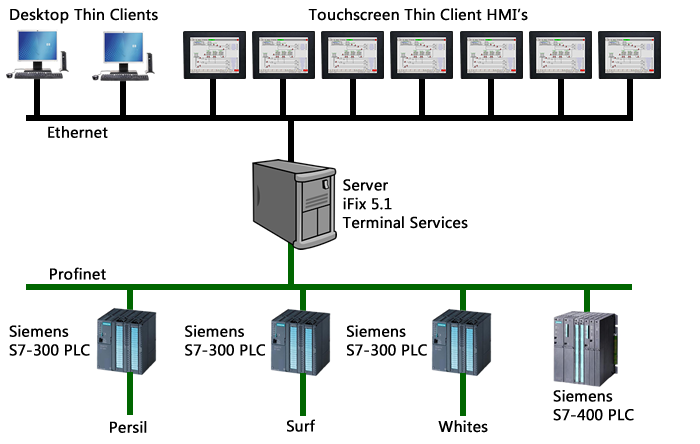The Project
The Unilever smart project involved designing and building a large infrastructure of 7 HMIs, 2 Desktops, 4 PLCs and a Server; these were linked using Profinet architecture. GE Fanuc iFix 5.1 was installed on the server along with 9 thin client licences; these thin clients were then used for terminal server sessions hosted on the server.
This meant that all the SCADA was kept in one place which meant any changes made on the server would be applied throughout the infrastructure. All sessions are hosted on the server opposed to installing the software on each machine, how terminal services works is explained below in detail.

The Terminal Server environment is a thin-client architecture where all application processing occurs centrally on the Server. By installing a small piece of thin-client software from Microsoft or connecting through an Internet Explorer 5.5 (or higher) browser, thin clients are able to initiate and run individual instances of iFIX on the Server. Only graphic, keyboard, and mouse instructions are sent back and forth between the client and the Server, minimizing network traffic.
You can install one copy of iFIX onto the server, allowing multiple users to run clients from the server. Upgrades and SIMs (Software Improvement Module) only need to be installed on the server.
Each user accesses the same set of pictures/drawings. When one picture/drawing is changed, all users get the changes.
Using the Terminal Services Advanced Client (TSAC) or Remote Desktop Protocol (RDP), clients can connect to the iFIX Terminal Server and access iFIX.
Data between the iFIX Terminal Server and the client session is encrypted. There is also additional security between the client machines and the iFIX Terminal Server. The connection can be set to restrict certain data to individual clients on the infrastructure.
The iFIX Terminal Server locally processes the software that the clients execute. Clients connecting to the Server do not need the processing power usually required to run iFIX. This allows clients running platforms from Windows 95 to Windows Server 2003 to execute iFIX through Terminal Server.